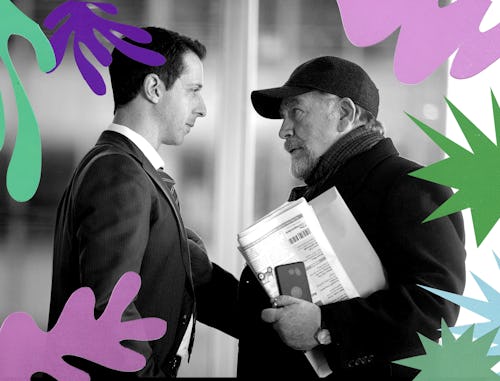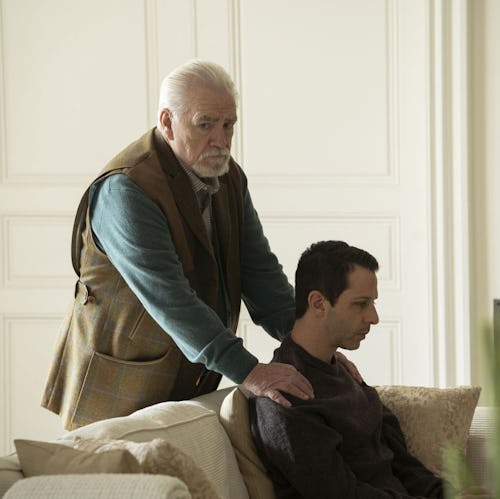
In the spring of 1991, after the release of a bystander video showing three Los Angeles Police Department officers brutally beating Rodney King, Tom Bradley, then mayor of L.A., commissioned a report on the city’s police department and its practices. Its findings were as horrifying as they were unsurprising. Excessive force was rampant and all but encouraged, with the worst offenders rarely, if ever disciplined. The report was largely a confirmation of things many Angelenos, especially non-white ones, already knew. But along with the report came reams of transcribed communication among the officers, usually sent between the computer systems mounted in patrol cars. In these messages, one acronym kept recurring, almost always in reference to crimes involving Black perpetrators or victims: NHI, “No Human Involved.”
A similar phrase echoes through the imagined scandal that drives the plot of Succession, the hit HBO dramedy from the British writer Jesse Armstrong. In the show — a fictionalized expansion of Armstrong’s beloved but unproduced script about the Murdochs — a family-controlled media conglomerate even bigger than NewsCorp is thrown into chaos when its patriarch suffers a stroke. As his children wrestle for current and future control, a major scandal is buried, then broken. Over many years, executives in charge of the corporation’s lucrative cruise division paid millions of dollars in settlements and spent millions more covering up sexual abuse, assault, and possibly even murder. If a harmed (or deceased) individual is “a sex worker or a migrant worker,” as a whistleblower explains, the event is marked in internal logs as an “incident NRPI,” or No Real Person Involved.

Like the LAPD, and like the real-world conglomerates on which Succession’s Waystar Royco is based, we are to understand that that corporation has been insulated from any meaningful consequences which might stem from these, or any, transgressions. (A preview that aired after Sunday’s season 3 premiere suggests a looming FBI investigation, though what teeth that has remains to be seen.) This is possible in part because of Waystar’s sheer size, resources, and direct influence on lawmakers. But, as in our world, we can assume there has been little appetite for any real accountability because Waystar’s crimes can appear abstract. In the same way armies and prisons are increasingly privatized, nudged toward invisibility, the trail of responsibility gets lost in a labyrinth of careful design, guilt subcontracted out like everything else.
We never see the cruise crimes committed; the one victim we meet in season 2 is decades and thousands of miles removed from them. But we do see something else. Succession has been praised for its balletic profanity and its excellent performances, but it is perhaps most impressive for the way it explicates the violence that glowers below the surface of American life. The way its characters react, or don’t, to attacks both silly and ferocious illuminates more about them, and about the lavish apparatus that protects them, than any palace intrigue could.
In the same way armies and prisons are increasingly privatized...guilt is subcontracted out like everything else.
It helps that these characters notionally keep their hands clean. That patriarch, Logan Roy, lives an exorbitantly expensive life, but he is not usually ostentatious, and almost never sentimental. (In the pilot, his son-in-law is made to feel like a fool for buying a $30,000 watch as his birthday present, as is his eldest son for presenting him with a sourdough starter.) Logan’s one indulgence in this direction is his collection of military medals — he prizes them, though never enlisted himself. Toward the end of the first season, at his daughter’s wedding, Logan strikes a deal with Eric Bogosian’s send-up of a Bernie Sanders-like presidential hopeful: lay off the attacks on the company, and the company’s news channels will lay off him. Bogosian’s character agrees. “Handshake?” he asks Logan. “I don’t think either of us want to get dirty,” he replies.
The safeguards are usually much more sophisticated than a dramatic retort. In the season 1 episode “Sad Sack Wasp Trap,” that son-in-law, Tom, takes over the cruise division from a beloved predecessor, Bill. After a cheery retirement celebration in the office, and with a disarming folksiness, Bill brings Tom into the loop by talking around the scandal. “I’ve turned off the wifi,” he tells his successor, “and this” — he pulls out a second laptop — “is air gapped. So I’m going to create a Word document for you, and then I’m going to print it, because I don’t want anything with my handwriting on it.” The Word document lists the storage file numbers of documents that “need to be handled,” plus an outside legal firm, and the contact information for a third figure who acts as a go-between for the firm and Waystar. It is of course ridiculous to believe that knowledge is really siloed like this, but the legal deniability is crucial“My dad always said he loved all his employees,” Kendall says, cutting Tom off before he can hear details of the crimes. “But he particularly loved the guys who ate the shit for him and he never even knew it.”
The family relies on that same separation when it goes on the offensive. As the revelation of the cruise scandal drags the company before Congress, Logan’s daughter, Shiv, is dispatched to speak with that lone victim we meet. The latter complains, while watching her children on a playground, of shadowy figures conducting “visits at night, turning up at work, weird email stuff.” When she nervously clarifies that she’s not accusing Shiv, personally, of any wrongdoing, Shiv replies “No — it’s perfectly possible. It’s outsourced security, so who knows what could be happening? It’s probably worse than you think.” That scene is the self-consciously gendered mirror of one in season 2’s premiere, where Kendall threatens his father’s corporate rivals while taking boastful ownership over the invisible machinations. “He will send people around,” Kendall says. “He will send men to kill your pets and fuck your wives, and it will never be over.”
When someone “attacks” Logan, it’s with a urine-filled balloon; when Kendall shuts down a digital publication he purchased for unionizing, an employee spits in his face. The fluids run right off both of them. Even the family’s recreation is sanitized in this way. The season 2 episode “Hunting” is best known for its broadest scene, but more telling is a sequence that comes earlier, when the attendees at Waystar’s corporate retreat in Hungary hunt lazily for wild boar. None of the executives succeed on their own; the Hungarian staff rounds up boar, stations the Americans along a dirt path, and invites them to shoot.

This insulation has a numbing effect on the characters. Sometimes this means they’re glib about the unimaginable, doing the sort of “victim math” Kendall accuses Waystar’s general counsel of when the scandal breaks in a magazine. (That scene recalls one in Armstrong’s Murdoch script, where two editors scoff at a reporter for trying to file a story about a mine collapse in Zambia with an insufficient number of dead Zambians.) After plotting to leak the cruises scandal, Shiv makes the astonishing decision to solicit an employee on a Roy-owned yacht for a threesome with her and her husband. Even when they’re momentarily perturbed, they can walk away. In the first season’s finale, Roman watches a satellite launch that he was supposed to oversee — and rushed through the safety-inspection process — go up in flames on a muted phone in a locked bathroom. For a second, he panics. Then he simply washes his hands.
Another consequence of that attitude is that, when one of their own seems threatened, the Roys have neither the language nor the emotional capacity to comfort them. Late in the second season, Roman is dispatched to Turkey to secure financing that might help take Waystar private. While there, he and two executives are caught in the middle of a soft coup, being prodded around a luxury hotel by militia mens’ assault rifles. He escapes, physically unscathed but clearly rattled, and meets the rest of his family on that yacht. When he does, Tom asks him if he had to “build a glider out of a Caesar salad” to fly away. Later in the episode, speaking to his siblings, Roman is strikingly sincere. “I did think,” he admits, “when I thought they were going to vacuum out my innards and fill me with concrete or something: If we come through this, is there a thing where we talk to each other about stuff? Normally?” Shiv and Kendall are speechless, until his sister affects a funny, garbled voice. “Talk to each other normally?”
The most unsettling example of this numbness comes in “Tern Haven,” when Kendall is speaking to Naomi Pierce,, the heiress to a liberal media fortune, in the back of a grounded helicopter late at night. Naomi clutches a bottle of vodka as she recounts the time Roy-family tabloids breathlessly covered one of her mental breakdowns. “I wrapped my fucking Audi around a highway divider,” she says between cackles and glares. Kendall limply tries to add a positive spin — “You know what the funny thing is, though” — but Naomi cuts him off. “That my wrist will never fully heal?” she asks. “Or that there’s photos of me, caked in blood with my femur poking out?” If Kendall feels anything it doesn’t show. “We all have something, right?” he asks flatly.
‘Sucession’ is impressive for the way it explicates the violence that glowers below the surface of American life.
The Roy kids compensate for this desensitization through various thrill-seeking behaviors: Roman mimes sexual deviance, Shiv invites exes to finger her in bright New Mexico parking lots, Connor makes a half-hearted bid for the White House. When Kendall has that conversation with Naomi, he is in the middle of his nth relapse — just liquor and coke this time, not the meth he tries in the desert (“Austerlitz”) or the ketamine he pines for at a bachelor party (“Prague.”) The second season’s “Safe Room” — the episode where a news employee fatally shoots himself at work, unnamed and offscreen — is bookended by Kendall’s two trips to the roof of Waystar’s office building. He’s up there to make a phone call, but the low railing invites the audience to imagine Kendall jumping. When he returns there that night, after a tearful, shockingly vulnerable conversation with his sister, there’s an added layer of security, plexiglass that stretches ten feet high.
In what is the series’ most shocking plot point to date, that cocoon of safety is actually, finally punctured. Kendall, searching for cocaine in rural England during his sister’s wedding reception, causes a car crash that kills a caterer, then flees the scene. This seems, for a time, to destroy him. It ends his involvement in the hostile takeover that he helped plan and makes him, for the near-entirety of season 2, his father’s willing puppet, grateful for the firewall Logan provides between him and the English police. At the end of that second season, Logan tells Kendall it has to be him who takes the fall for cruises. This would certainly end his chances at running Waystar, and might entail jail time, but Kendall is able — or appears able — to rationalize it. “It’s good to pay,” he says. “The boy.” But Logan scoffs: “No, no, no, not that. NRPI. You’re the best. Don’t beat yourself up. No real person involved. You know, it’s… it’s nothing.” It’s simply what has to be done for appearances.
Of course, Kendall doesn’t take the fall. He pulls a bait-and-switch at the press conference his father set up, claiming Logan had full knowledge of the abuse. When that storyline resumes, in the season 3 opener “Secession,” Kendall is about as far as one can be from haunted. “This is like OJ,” Greg says as he, Kendall, and an assistant move swiftly through Manhattan in an SUV. “Except,” Greg clarifies, “if OJ never killed anyone.” “Who said I never killed anyone?” Kendall replies, grinning from ear to ear.







